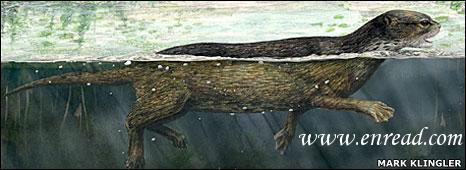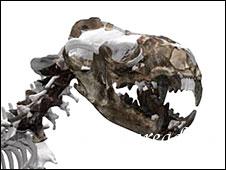'Missing link' fossil seal walked 北极化石补上海豹行走“缺失的一环”
(单词翻译:单击)
It may look like a cross between a seal and an otter1; but an Arctic fossil could, scientists say, hold the secret of seal evolution in its feet.
海豹和水獭的进化之间可能有交叉,但是科学家称,北极发现的一具化石可能揭开海豹的腿进化的秘密。
The scientists suggest this proto-seal lived on land and in fresh water
A skeleton unearthed2 in northern Canada shows a creature with feet that were probably webbed(有蹼的), but were not flippers.
Writing in the journal Nature, scientists suggest the 23 million-year-old proto-seal would have walked on land and swum in fresh water.
It is the oldest seal ancestor found so far and has been named Pujilla darwini.
Pujilla is the term for "young sea mammal" in the Inuktitut language, spoken by Inuit groups in Devon Island where the fossil was found.
And the reference to Charles Darwin honours the famous biologist's contention4(争论,争辩) that land mammals would naturally move into the marine5 environment via a fresh water stage, just as pinnipeds(鳍足类的) - seals, sealions and walruses6(海象) - have apparently7 done.
"The find suggests that pinnipeds went through a fresh water phase in their evolution," said Natalia Rybczynski from the Canadian Museum of Nature (CMN) in Ottawa, who led the fieldwork.
"It also provides us with a glimpse of what pinnipeds looked like before they had flippers."
Reconstructing the skeleton of the "walking seal"
The skeleton was about 65% complete, which enabled the researchers to reconstruct what the animal would have looked like in remarkable8 detail.
The legs suggest it would have walked upright on land; but the foot bones hint strongly at webbed feet. The fact that the remains9 were found in a former crater10 lake(火山口形成的深湖) that has also yielded fossil fish from the same period was additional evidence for a semi-aquatic11 past.
"The remarkably12 preserved skeleton of Pujilla had heavy limbs, indicative of well developed muscles, and flattened13 phalanges(趾骨) (finger or toe bones) which suggest that the feet were webbed - but not flippers," said Mary Dawson from the Carnegie Museum of Natural History in Pittsburgh, US, another of the scientists involved.
"This animal was likely adept14 at(熟练于) both swimming and walking on land. Pujilla is the evolutionary15 evidence we have been lacking for so long."
Until now, the most primitive16(原始的) fossil pinniped was a creature called Enaliarctos that dates from about the same period and appears to have lived in the sea along the northwestern coasts of North America.
Enaliarctos had flippers, but may have had to bring its prey17 to the shore for eating, whereas modern pinnipeds manage it at sea.
Intriguingly18(有趣地), different species of present-day seal swim in different ways - either rotating their flippers, or waving their hind19-quarters from side to side, using the hind limbs(后肢) for propulsion(推进,拖动力).
Enaliarctos appears to have been capable of both modes of swimming - and as a four-legged animal with four webbed feet, Pujilla is a logical fore-runner of this creature which could swim with all four limbs.
The new discovery also shows, the scientists say, that seals, sealions and walruses very likely had their origins in the Arctic.
Darwin forecast the transition from land to sea via fresh water in his seminal20(精液的,生殖的) work On the Origin of Species, published 150 years ago this year.
"A strictly21 terrestrial animal(陆生动物), by occasionally hunting for food in shallow water, then in streams or lakes, might at last be converted in an animal so thoroughly22 aquatic(水生的) as to brace23 the open ocean," he wrote.
 收听单词发音
收听单词发音
1
otter

|
|
| n.水獭 | |
参考例句: |
|
|
|
2
unearthed

|
|
| 出土的(考古) | |
参考例句: |
|
|
|
3
flip

|
|
| vt.快速翻动;轻抛;轻拍;n.轻抛;adj.轻浮的 | |
参考例句: |
|
|
|
4
contention

|
|
| n.争论,争辩,论战;论点,主张 | |
参考例句: |
|
|
|
5
marine

|
|
| adj.海的;海生的;航海的;海事的;n.水兵 | |
参考例句: |
|
|
|
6
walruses

|
|
| n.海象( walrus的名词复数 ) | |
参考例句: |
|
|
|
7
apparently

|
|
| adv.显然地;表面上,似乎 | |
参考例句: |
|
|
|
8
remarkable

|
|
| adj.显著的,异常的,非凡的,值得注意的 | |
参考例句: |
|
|
|
9
remains

|
|
| n.剩余物,残留物;遗体,遗迹 | |
参考例句: |
|
|
|
10
crater

|
|
| n.火山口,弹坑 | |
参考例句: |
|
|
|
11
aquatic

|
|
| adj.水生的,水栖的 | |
参考例句: |
|
|
|
12
remarkably

|
|
| ad.不同寻常地,相当地 | |
参考例句: |
|
|
|
13
flattened

|
|
| [医](水)平扁的,弄平的 | |
参考例句: |
|
|
|
14
adept

|
|
| adj.老练的,精通的 | |
参考例句: |
|
|
|
15
evolutionary

|
|
| adj.进化的;演化的,演变的;[生]进化论的 | |
参考例句: |
|
|
|
16
primitive

|
|
| adj.原始的;简单的;n.原(始)人,原始事物 | |
参考例句: |
|
|
|
17
prey

|
|
| n.被掠食者,牺牲者,掠食;v.捕食,掠夺,折磨 | |
参考例句: |
|
|
|
18
intriguingly

|
|
参考例句: |
|
|
|
19
hind

|
|
| adj.后面的,后部的 | |
参考例句: |
|
|
|
20
seminal

|
|
| adj.影响深远的;种子的 | |
参考例句: |
|
|
|
21
strictly

|
|
| adv.严厉地,严格地;严密地 | |
参考例句: |
|
|
|
22
thoroughly

|
|
| adv.完全地,彻底地,十足地 | |
参考例句: |
|
|
|
23
brace

|
|
| n. 支柱,曲柄,大括号; v. 绷紧,顶住,(为困难或坏事)做准备 | |
参考例句: |
|
|
|






